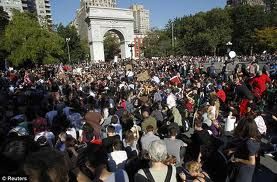Like his predecessor, George W. Bush, President Barack Obama went to his Office of Legal Council on how to circumvent an executive order banning assassinations, a federal law against murder, protections in the Bill of Rights and various strictures of the international laws of war to “legally” order and successfully carry out the assassination of American citizen Anwar al-Awlaki last month in Yemen. According to an article by reporter Charles Savage in the New York Times, the 50 page memorandum was completed in June of last year. It was written specifically in regard to only al-Awlaki and did not examine the evidence against him:
The legal analysis, in essence, concluded that Mr. Awlaki could be legally killed, if it was not feasible to capture him, because intelligence agencies said he was taking part in the war between the United States and Al Qaeda and posed a significant threat to Americans, as well as because Yemeni authorities were unable or unwilling to stop him.
The memorandum, which was written more than a year before Mr. Awlaki was killed, does not independently analyze the quality of the evidence against him.
[]
It was principally drafted by David Barron and Martin Lederman, who were both lawyers in the Office of Legal Counsel at the time, and was signed by Mr. Barron. The office may have given oral approval for an attack on Mr. Awlaki before completing its detailed memorandum. Several news reports before June 2010 quoted anonymous counterterrorism officials as saying that Mr. Awlaki had been placed on a kill-or-capture list around the time of the attempted bombing of a Detroit-bound airliner on Dec. 25, 2009. Mr. Awlaki was accused of helping to recruit the attacker for that operation.
[]
Other assertions about Mr. Awlaki included that he was a leader of the group, which had become a “cobelligerent” with Al Qaeda, and he was pushing it to focus on trying to attack the United States again. The lawyers were also told that capturing him alive among hostile armed allies might not be feasible if and when he were located.
Based on those premises, the Justice Department concluded that Mr. Awlaki was covered by the authorization to use military force against Al Qaeda that Congress enacted shortly after the terrorist attacks of Sept. 11, 2001 – meaning that he was a lawful target in the armed conflict unless some other legal prohibition trumped that authority.
Mr. Savage goes on to detail how each legal obstacle was considered and rejected:
The executive order the lawyers concluded only pertained to the assassination of political leaders outside of war;
The statute that makes it illegal to murder of US nationals on foreign soil did apply “because it is not “murder” to kill a wartime enemy in compliance with the laws of war.”;
It concluded that if the operator of the drone was a civilian of the CIA it wold not be a war crime and although it would violate the laws of Yemen, ti would be unlikely that Yemen would seek to prosecute;
Last to be considered and dispensed with were those pesky amendments in the Bill of Rights that guarantee “the right of the people to be secure in their persons, houses, papers, and effects, against unreasonable searches and seizures” and the right to due process:
The memo concluded that what was reasonable, and the process that was due, was different for Mr. Awlaki than for an ordinary criminal. It cited court cases allowing American citizens who had joined an enemy’s forces to be detained or prosecuted in a military court just like noncitizen enemies.
It also cited several other Supreme Court precedents, like a 2007 case involving a high-speed chase and a 1985 case involving the shooting of a fleeing suspect, finding that it was constitutional for the police to take actions that put a suspect in serious risk of death in order to curtail an imminent risk to innocent people.
The document’s authors argued that “imminent” risks could include those by an enemy leader who is in the business of attacking the United States whenever possible, even if he is not in the midst of launching an attack at the precise moment he is located.
Despite the argument that will be made by the right wing Obama supporters that the memorandum is specific to al-Awlaki, all the arguments that were made to justify his assassination could easily be made against any US citizen anywhwere and may already have been:
American militants like Anwar al-Awlaki are placed on a kill or capture list by a secretive panel of senior government officials, which then informs the president of its decisions . . . . There is no public record of the operations or decisions of the panel, which is a subset of the White House’s National Security Council . . . . Neither is there any law establishing its existence or setting out the rules by which it is supposed to operate. . . . The role of the president in ordering or ratifying a decision to target a citizen is fuzzy. White House spokesman Tommy Vietor declined to discuss anything about the process. . . .
Glenn Greenwald at Salon in his excellent article considers that al-Awlaki won’t be the last victim:
Officials in the Obama White House and then the President decreed in secret that Awlaki should die. So the U.S. Government killed him. Republicans who always cheer acts of violence against Muslims are joined by Democrats who reflexively cheer what this Democratic President does, and now this death panel for U.S. citizens – operating with no known rules, transparency, or oversight – is entrenched as bipartisan consensus and a permanent fixture of American political life. I’m sure this will never be abused: unrestrained power exercised in secret has a very noble history in the U.S. (Reuters says that the only American they could confirm on the hit list is Awlaki, though Dana Priest reported last year that either three or four Americans were on a hit list).
Anyway, look over there: wasn’t it outrageous how George Bush imprisoned people without any due process and tried to seize unrestrained power, and isn’t it horrifying what a barbaric death cult Republicans are for favoring executions even when there’s doubt about guilt? Even for those deeply cynical about American political culture: wouldn’t you have thought a few years ago that having the President create a White House panel to place Americans on a CIA hit list – in secret, without a shred of due process – would be a bridge too far?
The tales of through the looking glass continue.



 Welcome to the Stars Hollow Health and Fitness weekly diary. It will publish on Saturday afternoon and be open for discussion about health related issues including diet, exercise, health and health care issues, as well as, tips on what you can do when there is a medical emergency. Also an opportunity to share and exchange your favorite healthy recipes.
Welcome to the Stars Hollow Health and Fitness weekly diary. It will publish on Saturday afternoon and be open for discussion about health related issues including diet, exercise, health and health care issues, as well as, tips on what you can do when there is a medical emergency. Also an opportunity to share and exchange your favorite healthy recipes. 
Recent Comments